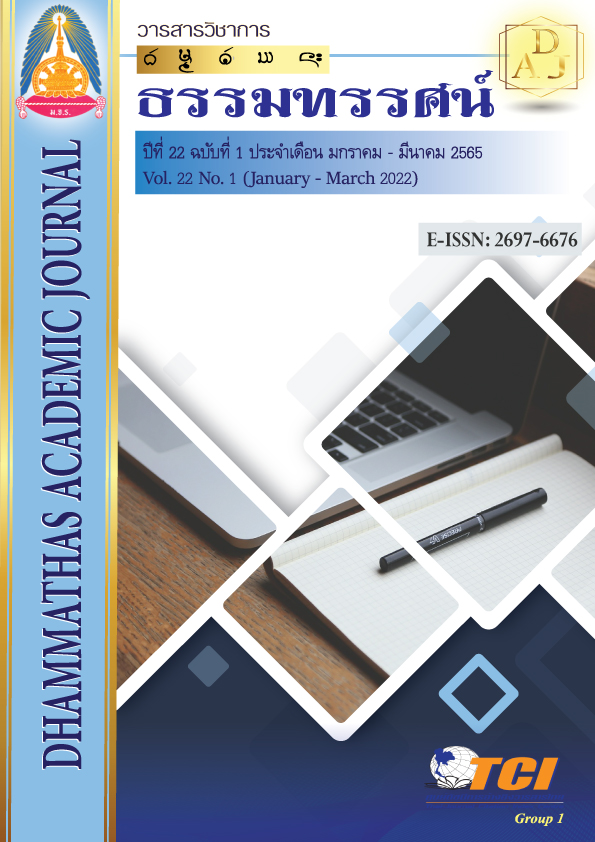An Approach for Developing Descriptive Paragraph Writing Competence through FRESH for Thai Tertiary Students
Main Article Content
บทคัดย่อ
This experimental research aimed to 1) determine whether there are any significant differences in descriptive paragraph writing competence before and after practicing "FRESH" of students majoring in English at Rajamangala University of Technology Isan Sakon Nakhon Campus (RMUTI SKC), 2) examine students' attitudes towards learning English after practicing "FRESH", and 3) propose guidelines for developing students’ paragraph writing competence through “FRESH” for Thai Tertiary students. The informants in the study included 54 students studying English at the Department of Liberal Arts, Faculty of Industry Technology, RMUTI SKC in 2020. They were selected by a purposive sampling method. The data were obtained through the written pretest and posttest and the attitude scale. The data were analyzed using the SPSS program. The t-test for dependent samples was used to compare and test the differences between the written pretest and posttest scores. The descriptive statistics, including mean, standard deviation, and percentage were used to describe the data basic patterns of the test scores and attitudes towards students' English learning.
The results revealed as follows:
1. There is a statistically significant difference at .00 between the pretest and posttest mean scores. The students' descriptive paragraph writing mean scores in the pretest and posttest were 15.53 and 30.84, respectively. That means the students'
descriptive paragraph writing competence improved after practicing "FRESH".
2. The mean score of the students' attitudes towards learning English was at a high level (mean = 3.22).
It can be concluded that "FRESH" can be an alternative technique to help students organize ideas and make a meaningful sensory descriptive paragraph.
Article Details

อนุญาตภายใต้เงื่อนไข Creative Commons Attribution-NonCommercial-NoDerivatives 4.0 International License.
เพื่อให้เป็นไปตามกฎหมายลิขสิทธิ์ ผู้นิพนธ์ทุกท่านต้องลงลายมือชื่อในแบบฟอร์มใบมอบลิขสิทธิ์บทความ ให้แก่วารสารฯ พร้อมกับบทความต้นฉบับที่ได้แก้ไขครั้งสุดท้าย นอกจากนี้ ผู้นิพนธ์ทุกท่านต้องยืนยันว่าบทความ ต้นฉบับที่ส่งมาตีพิมพ์นั้น ได้ส่งมาตีพิมพ์เฉพาะในวารสาร วิชาการธรรม ทรรศน์ เพียงแห่งเดียวเท่านั้น หากมีการใช้ ภาพหรือตารางของผู้นิพนธ์อื่นที่ปรากฏในสิ่งตีพิมพ์อื่นมาแล้ว ผู้นิพนธ์ต้องขออนุญาตเจ้าของลิขสิทธิ์ก่อน พร้อมทั้ง แสดงหนังสือที่ได้รับการยินยอมต่อบรรณาธิการ ก่อนที่บทความจะได้รับการตีพิมพ์เอกสารอ้างอิง
Agullo, G. L. (2006). Overcoming age-related differences. ELT Journal, 60(4), 365-373.
Al-Tamimi, A., & Shuib, M. (2009). Motivation and attitudes towards learning English: A study of petroleum engineering undergraduates at Hadhramout University of Sciences and Technology. GEMA Online Journal of Language Studies, 9(2), 29-55.
Anil, B. (2017). Applying innovative teaching methods in a second language classroom. International Journal of Research in English Education, 20, 1-9.
Faisal. (2010). Penerapan “FRESH”untuk mengembangkan paragraf deskriptif bagi guru LBPP LIA purwokerto. Purwokerto: Unpublished Research Report.
Faisal & Suwandita, K. (2013). The effectiveness of FRESH technique to teach descriptive paragraph. Journal of Education and Learning, 7(4), 239-248.
Faisal & Wulandari, Y. (2013). Improving students' competence in writing descriptive texts through "FRESH" technique. English Review: Journal of English Education, 2(1), 57-65.
Karahan, F. (2007). Language attitudes of Turkish students towards the English language and its use in Turkish context. Journal of Arts and Science Say, 7, 73-87.
Kurniawati, N., Syafar, A., & Hastini. (2017). Applying FRESH technique in teaching writing descriptive paragraph of the seventh grade EFL-learners. E-Journal of ELTS (English Language Teaching Society), 5(1), 1-13.
Masyhud. (2010). The problems faced by students in writing essay both in individual work and in group work. [Unpublished Thesis]. University of Muhammadiyah Malang, Indonesia.
Starks, D. & Paltridge, B. (1996). A note on using sociolinguistic methods to study non-native attitudes towards English. World Englishes, 15(2), 217-224.
WGU. (2020). Five educational learning theories. Western Governors University. Retrieved from https://www.wgu.edu/blog/five-educational-learning-theories2005.html#close.

